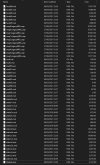Hybrid
Member
I configured a Docker container that successfully compiles and runs a fresh install of the latest ServUO (publish 57 at the time of writing this) on my Synology NAS. It reads the necessary game files from a folder within ServUO, and I can connect to it fine using the EC Launcher tool.
However, whenever I try any variant of the classic client it ends up crashing after selecting the shard (Razor/RazorEnhanced + normal client), or it gets stuck on the "Login to Shard" step (ClassicUO with or without ClassicAssist) and does not reach character select, which ServUO normally mentions in its console.
I'm somewhat at a loss as to why this occurs. Because EC works I thought maybe there are some game files missing, but even when I compile with the full client it doesn't change anything. Does anyone know what I'm missing? I've included some technicals below.
There's nothing particularly special about how the Docker container is set up, but I'll include both the Dockerfile and docker-compose.yml file here just in case it would matter:
Both the servuo and game_files directories are set through Synology's Docker UI. I went into the container and can verify they map correctly.
The game files ServUO was compiled with:

However, whenever I try any variant of the classic client it ends up crashing after selecting the shard (Razor/RazorEnhanced + normal client), or it gets stuck on the "Login to Shard" step (ClassicUO with or without ClassicAssist) and does not reach character select, which ServUO normally mentions in its console.
I'm somewhat at a loss as to why this occurs. Because EC works I thought maybe there are some game files missing, but even when I compile with the full client it doesn't change anything. Does anyone know what I'm missing? I've included some technicals below.
There's nothing particularly special about how the Docker container is set up, but I'll include both the Dockerfile and docker-compose.yml file here just in case it would matter:
Dockerfile:
FROM ubuntu:20.04
RUN apt-get update && apt-get install -y wget && \
wget https://packages.microsoft.com/config/ubuntu/20.04/packages-microsoft-prod.deb -O packages-microsoft-prod.deb && \
dpkg -i packages-microsoft-prod.deb && \
apt-get update && \
apt-get install -y apt-transport-https && \
apt-get install -y dotnet-sdk-5.0 zlib1g-dev mono-complete make
RUN mkdir /servuo /game_files
WORKDIR /servuo
EXPOSE 2593
docker-compose.yml:
services:
servuo:
build:
context: .
restart: always
volumes:
- ./servuo:/servuo
- ./game_files:/game_files
ports:
- "2593:2593"
command: make
volumes:
servuo: {}
game_files: {}Both the servuo and game_files directories are set through Synology's Docker UI. I went into the container and can verify they map correctly.
The game files ServUO was compiled with:

